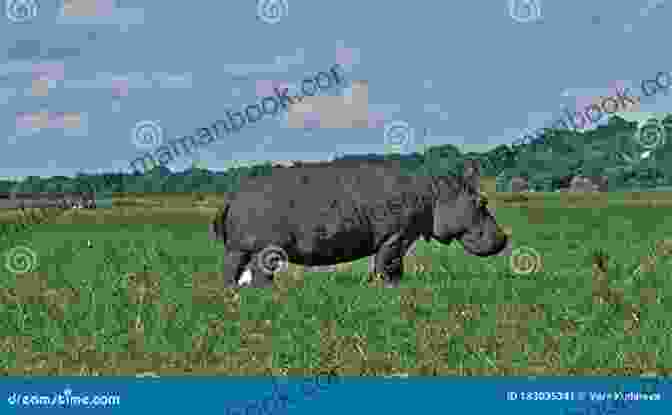The American Hippopotamus: A Surprising and Enduring Frontier of Science


The hippopotamus is a massive, semi-aquatic mammal that is native to sub-Saharan Africa. It is the third-largest land animal, after the elephant and the rhinoceros. Hippopotamuses are herbivores and spend most of their time in water or wallowing in mud. They are territorial and aggressive, and their tusks can grow up to 18 inches long.
In the 19th century, hippopotamuses were introduced to the United States. The first recorded sighting of a hippopotamus in the United States was in 1859, when a group of explorers brought a pair of hippos to New Orleans. The hippos were kept in a zoo for a short time, but they eventually escaped and made their way into the wild. Over the next few decades, several other hippos were brought to the United States, and they established a small population in the swamps of Louisiana.
4 out of 5
| Language | : | English |
| File size | : | 704 KB |
| Text-to-Speech | : | Enabled |
| Screen Reader | : | Supported |
| Enhanced typesetting | : | Enabled |
| X-Ray | : | Enabled |
| Word Wise | : | Enabled |
| Print length | : | 115 pages |
| Lending | : | Enabled |
The American hippopotamus population grew slowly at first, but it began to increase rapidly in the early 20th century. By the 1950s, there were an estimated 500 hippos living in the swamps of Louisiana. The hippos became a nuisance to local farmers and ranchers, and they were often hunted for their meat and ivory.
In 1962, the Louisiana Department of Wildlife and Fisheries began a program to eradicate the hippopotamus population. The program was successful, and by the early 1970s, the last known hippopotamus in Louisiana had been killed.
However, the American hippopotamus population did not die out completely. In the 1990s, a small group of hippos was discovered living in the Atchafalaya Basin, a vast wetland area in southern Louisiana. These hippos were the descendants of the hippos that had escaped from the zoo in New Orleans in the 19th century.
The Atchafalaya Basin hippos have thrived in their new environment. They have a plentiful supply of food and water, and they are not threatened by hunters. The population has grown to an estimated 100 hippos, and they are now considered to be a native species in Louisiana.
The American hippopotamus is a unique and fascinating animal. It is the only hippopotamus population that lives outside of Africa, and it is a testament to the resilience of this species. The hippos of the Atchafalaya Basin are a valuable part of the ecosystem, and they are a reminder of the interconnectedness of the natural world.
The Biology of the American Hippopotamus
The American hippopotamus is very similar to its African cousin. It is a large, semi-aquatic mammal with a thick, hairless hide. Hippopotamuses have large heads with small eyes and ears. Their nostrils are located on the top of their heads, which allows them to breathe while they are submerged in water.
Hippopotamus have four short, powerful legs. Their feet are webbed, which helps them to swim and walk through mud. Hippopotamuses also have large, tusks that can grow up to 18 inches long. Their tusks are used for defense and for fighting with other hippos.
Hippopotamus are herbivores and spend most of their time grazing on grass and other vegetation. They are also known to eat aquatic plants and fruits. Hippopotamuses are territorial and aggressive animals. They will defend their territory from other hippos and from other animals. Hippopotamuses are also known to attack humans, especially if they feel threatened.
The Ecology of the American Hippopotamus
The American hippopotamus population in the Atchafalaya Basin is a unique and valuable part of the ecosystem. Hippopotamuses are herbivores, and they help to control the growth of vegetation. They also create wallows, which are depressions in the ground that are filled with water. Wallows provide a habitat for other animals, such as fish, amphibians, and reptiles.
Hippopotamus are also a source of food for other animals. Their meat is eaten by alligators, crocodiles, and large cats. Their tusks are also used to make ivory products.
The Future of the American Hippopotamus
The American hippopotamus population in the Atchafalaya Basin is a relatively small and isolated population. However, the population is growing, and it is expected to continue to grow in the future. The hippos are not threatened by hunters, and they have a plentiful supply of food and water. The biggest threat to the hippos is the loss of habitat. The Atchafalaya Basin is a rapidly developing area, and there is concern that the hippos will lose their habitat to human development.
The future of the American hippopotamus is uncertain. However, the hippos are a resilient species, and they have adapted well to their new environment. The hippos are a valuable part of the ecosystem, and they deserve to be protected.
4 out of 5
| Language | : | English |
| File size | : | 704 KB |
| Text-to-Speech | : | Enabled |
| Screen Reader | : | Supported |
| Enhanced typesetting | : | Enabled |
| X-Ray | : | Enabled |
| Word Wise | : | Enabled |
| Print length | : | 115 pages |
| Lending | : | Enabled |
Do you want to contribute by writing guest posts on this blog?
Please contact us and send us a resume of previous articles that you have written.
 Top Book
Top Book Novel
Novel Fiction
Fiction Nonfiction
Nonfiction Literature
Literature Paperback
Paperback Hardcover
Hardcover E-book
E-book Audiobook
Audiobook Bestseller
Bestseller Classic
Classic Mystery
Mystery Thriller
Thriller Romance
Romance Fantasy
Fantasy Science Fiction
Science Fiction Biography
Biography Memoir
Memoir Autobiography
Autobiography Poetry
Poetry Drama
Drama Historical Fiction
Historical Fiction Self-help
Self-help Young Adult
Young Adult Childrens Books
Childrens Books Graphic Novel
Graphic Novel Anthology
Anthology Series
Series Encyclopedia
Encyclopedia Reference
Reference Guidebook
Guidebook Textbook
Textbook Workbook
Workbook Journal
Journal Diary
Diary Manuscript
Manuscript Folio
Folio Pulp Fiction
Pulp Fiction Short Stories
Short Stories Fairy Tales
Fairy Tales Fables
Fables Mythology
Mythology Philosophy
Philosophy Religion
Religion Spirituality
Spirituality Essays
Essays Critique
Critique Commentary
Commentary Glossary
Glossary Bibliography
Bibliography Index
Index Table of Contents
Table of Contents Preface
Preface Introduction
Introduction Foreword
Foreword Afterword
Afterword Appendices
Appendices Annotations
Annotations Footnotes
Footnotes Epilogue
Epilogue Prologue
Prologue Christoph Fischer
Christoph Fischer Michael F Fleming
Michael F Fleming Nancy Cunningham
Nancy Cunningham Marc Monroe
Marc Monroe Eminent Paul Sokomba
Eminent Paul Sokomba Holly Alexander
Holly Alexander Nigel Farndale
Nigel Farndale Moses Rosenkranz
Moses Rosenkranz Aharon Appelfeld
Aharon Appelfeld Dai Hunter
Dai Hunter Timothy D Kanold
Timothy D Kanold Leah Fleming
Leah Fleming Carolina Mac
Carolina Mac Samuel Cord Stier
Samuel Cord Stier Michelle O Brien Palmer
Michelle O Brien Palmer Linda K Rogers
Linda K Rogers P D Workman
P D Workman Martin Shields
Martin Shields Anthony D Fredericks
Anthony D Fredericks Ernest Renan
Ernest Renan
Light bulbAdvertise smarter! Our strategic ad space ensures maximum exposure. Reserve your spot today!

 Brent FosterPomegranate Sky Aurora: New Fiction Explores the Complexities of Human Nature
Brent FosterPomegranate Sky Aurora: New Fiction Explores the Complexities of Human Nature Liam WardFollow ·18.6k
Liam WardFollow ·18.6k Fred FosterFollow ·13k
Fred FosterFollow ·13k Robert HeinleinFollow ·18k
Robert HeinleinFollow ·18k Davion PowellFollow ·5.1k
Davion PowellFollow ·5.1k Grant HayesFollow ·16.6k
Grant HayesFollow ·16.6k David MitchellFollow ·16.2k
David MitchellFollow ·16.2k Carlos DrummondFollow ·2.9k
Carlos DrummondFollow ·2.9k Nathaniel HawthorneFollow ·2.1k
Nathaniel HawthorneFollow ·2.1k

 Ignacio Hayes
Ignacio HayesShipwrecked For 13 Days On Coral Reef: A Tale of Survival...
In the vast expanse of the...

 Gerald Parker
Gerald ParkerWhere the World Is Quiet: Delving into a Realm of Serene...
A Tapestry of Serenity In the tapestry...

 Charles Bukowski
Charles BukowskiPloughshares Winter 2009: Guest Edited by Tony Hoagland
Ploughshares...

 Rubén Darío
Rubén DaríoAnthology of Massachusetts Poets: William Stanley...
William Stanley...

 Jason Hayes
Jason HayesSean Kenney's Mesmerizing Robot Masterpieces: A Journey...
In a realm where imagination meets...

 Terence Nelson
Terence NelsonUnveiling the Elite Force: The Commander Men of Hidden...
In the shadows of society, where justice...
4 out of 5
| Language | : | English |
| File size | : | 704 KB |
| Text-to-Speech | : | Enabled |
| Screen Reader | : | Supported |
| Enhanced typesetting | : | Enabled |
| X-Ray | : | Enabled |
| Word Wise | : | Enabled |
| Print length | : | 115 pages |
| Lending | : | Enabled |










